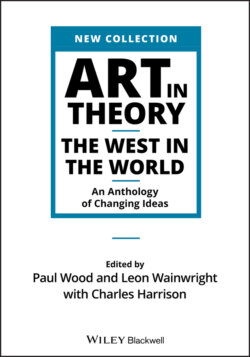Читать книгу Art in Theory - Группа авторов - Страница 46
Of the nature and manners of the people
ОглавлениеIt resteth I speak a word or two of the natural inhabitants, their natures and manners, leaving large discourse thereof until time more convenient hereafter. […]
They are people clothed with loose mantles made of deer skins, and aprons of the same round about their middles; all else naked; of such a difference of statures only as we in England; having no edge tools or weapons of iron or steel to offend us withal, neither know they how to make any: those weapons they have are only bows made of witch hazel, and arrows of reeds; flat‐edged truncheons also of wood about a yard long, neither have they anything to defend themselves but targets [shields] made of barks; and some armours made of sticks wickered together with thread.
Their towns are but small, and near the sea coast but few, some containing but 10 or 12 houses; some 20. The greatest that we have seen have been but of 30 houses: if they be walled it is only done with barks of trees made fast to stakes, or else with poles only fixed upright and close one by another.
Their houses are made of small poles made fast at the tops in round form after the manner as is used in many arbories in our gardens of England, in most towns covered with barks, and in some with artificial mats made of long rushes; from the tops of the houses down to the ground. […]
In respect of us they are a people poor, and for want of skill and judgement in the knowledge and use of our things, do esteem our trifles before things of greater value: Notwithstanding in their proper manner considering the want of such means we have, they seem very ingenious; For although they have no such tools, nor any such crafts, sciences and arts as we; yet in those things they do, they show excellency of wit. And by how much they upon due consideration shall find our manner of knowledges and crafts to exceed theirs in perfection, and speed for doing or execution, by so much the more is it probable that they should desire our friendship and love, and have the greater respect for pleasing and obeying us. Whereby may be hoped if means of good government be used, that they may in short time be brought to civility, and the embracing of true religion.
Some religion they have already, which although it be far from the truth, yet being as it is, there is hope it may be the easier and sooner reformed.
They believe that there are many Gods which they call Mantóac, but of different sorts and degrees; one only chief and great God, which hath been from all eternity. Who as they affirm when he purposed to make the world, made first other gods of a principal order to be as means and instruments to be used in the creation and government to follow; and after the Sun, Moon, and Stars, as petty gods and the instruments of the other order more principal. First they say were made waters, out of which by the gods was made all diversity of creatures that are visible or invisible.
For mankind they say a woman was made first, which by the working of one of the gods, conceived and brought forth children: and in such sort they say they had their beginning.
But how many years or ages have passed since, they say they can make no relation, having no letters nor other such means as we to keep records of the particularities of times passed, but only tradition from father to son.
They think that all the gods are of human shape and therefore they represent them by images in the forms of men, which they call Kewasowok one alone is called Kewás; them they place in houses appropriate or temples which they call Mathicómuck; where they worship, pray, sing, and make many times offerings unto them. In some Mathicómuck we have seen but one Kewas, in some two, and in other some three. The common sort think them to be also gods. […]
Most things they saw with us, as mathematical instruments, sea compasses, the virtue of the lodestone in drawing iron, a perspective glass whereby was showed many strange sights, burning glasses, wildfire works, guns, books, writing and reading, spring clocks that seem to go of themselves, and many other things that we had, were so strange unto them, and so far exceeded their capacities to comprehend the reason and means how they should be made and done, that they thought they were rather the works of gods than of men, or at the leastwise they had been given and taught us of the gods. […]
